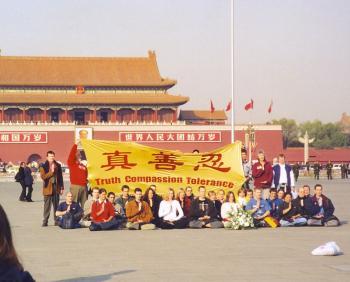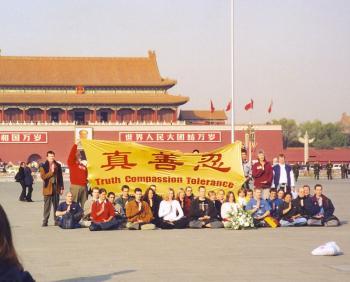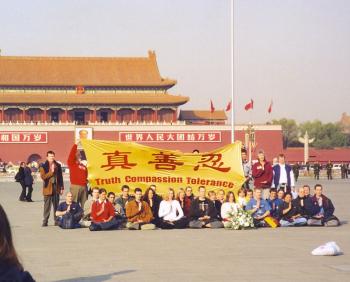The regime’s web of control was breached in broad daylight right in the symbolic heart of Beijing on Nov. 20, 2001 by 36 practitioners of Falun Gong.
They quietly converged from Europe, Australia, and North America at a pre-arranged point, at 2:00 p.m. on a sunny Tuesday. They posed, chatting and laughing, as if for a class reunion photo. Then, on signal, most sat down and crossed their legs to meditate, while a few stood tall to hold up a large, golden banner reading “Truth Compassion Tolerance” in English and Chinese.
For a moment, the principles of Falun Gong were displayed openly, while behind them the Chinese words written on Tiananmen (the “Gate of Heavenly Peace”) formed a backdrop that has seldom been more accurate: “Long live all the peoples of the world united together.”
Twenty seconds later police vans surrounded them, and the world witnessed a microcosm of the persecution of Falun Gong in China: police dragging away peaceful people while tearing down the words “Truth, Compassion, Tolerance.”
“Such an act scared the Chinese authorities,” Chen Yonglin, a former diplomat at Sydney’s Chinese Consulate, said in an email. “[They feared] a massive assembly which would lead to the collapse of the communist government.”
Act of Courage Defied Chinese Regime’s Control
Nine years ago a group of Westerners came together in China on Tiananmen Square to protest the persecution of Falun Gong.

Western Falun Gong adherents shock Chinese officials and bring encouragement to Chinese adherents by protesting on Tiananmen Square on Nov. 20, 2001. The Epoch Times Photo Archive

Charlotte Cuthbertson
Senior Reporter
|Updated:
When three dozen Westerners suddenly and peacefully appeared on Tiananmen Square with a simple message nine years ago, the story made media headlines worldwide. But it also carried hope to the dark corners of China’s slave labor camps, and shook up the plush offices of Chinese consulates around the globe.





